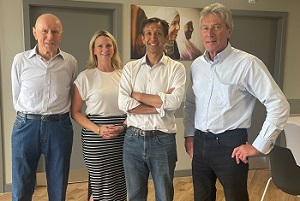Vision News
Plymouth pensioner opens surgeons’ eyes to a bygone era
Plymouth pensioner opens surgeons’ eyes to a bygone era
A CATARACT patient has given eyecare specialists a rare insight into the changes of sight-saving surgery during the past three decades.

Barrie Furzeland was at Newmedica Plymouth eye clinic to have a cataract operation when he astonished the team with tales of having a cataract removed from his other eye 34 years previously.
Consultants were amazed because they’d never heard of anyone going such a long time between two cataract surgeries, so they invited him back to share more details about medical science’s incredible leaps forward.
Normally, people go a few months or maybe even a couple of years between cataract-removal operations, so the team was fascinated to hear Barrie’s descriptions of the procedure he underwent before some of them were even in school.
Barrie explained that his first cataract had been caused by a freak impact trauma he sustained when the knot on a lawnmower’s starter cord hit him in the eyeball.
He said he wasn’t able to pay £800 to have the surgery he needed, so he was left blind in one eye by the cataract for nine months while he was on the waiting list.
Barrie, 74, added: “My eye was watering like hell and it was grey and I couldn’t see out of it. I’d gone to the eye infirmary and the doctor asked how long it’d been going on, and I said I got it the day before. He was surprised it was so immediate.
“Eventually, after three quarters of a year, I was called in. The hospital was so old-fashioned, like the Victorian era. I felt I’d travelled back in time.
“After the operation, I had to wear a bandage and a shield over my eye. When they took it off, because I wasn’t used to sunlight, I was almost blinded by the brightness, so I then had to wear sunglasses for a couple of weeks.”
Fast forward to 2023. A cataract that had been developing in Barrie’s other eye was getting worse. Unlike his first experience, he only waited a few weeks for his surgery at Newmedica Plymouth.
He said: “After the surgery I was amazed at the quality of my vision. When I had my first cataract done, I was still in hospital two days later. Nowadays, it’s a 10-minute procedure and you go home without any pain.
“Straightaway, I was able to read, row on the river, walk the dogs, play golf, do some gardening and mow the wicket on the cricket pitch.
“It’s incredible what they did and the speed they did it. Of course, 34 years ago there wasn’t the technology that they have now. Today’s machinery must cost millions.
“I know some people won’t have the operation, but I really don’t understand that. It’s so quick and painless, so I’d definitely advise anyone to have it done. The difference it makes to your life is unbelievable. I never ever thought my sight would be as good as it is now. It’s better than it was 50 years ago.”
Cataracts form when the lens of a person’s eye develops cloudy patches. Over time these patches can become bigger, causing blurred vision and eventually blindness if untreated.
In 1990 there were 105,000 cataract operations undertaken in England. Today 330,000 are carried out.
Mr Vasant Raman, a consultant at Newmedica Plymouth, said: “It was wonderful to have Mr Furzeland back to tell us his experiences of surgery 34 years ago. I’ve never heard of someone going so long between cataract surgeries, so his insights gave us a unique understanding of the patient’s perspective of the technological innovation and how it impacts the post-operation recovery and the visual rehabilitation.
“Of course, with the progress of technology and medical research, our procedures are significantly more efficient today, in many ways. Surgery takes 10 minutes and is performed under local anaesthetics instead of what might have been an hour and 30 minutes years ago, with most operations conducted under general anaesthesia back then.”
Newmedica Plymouth is run by a team of five local partners – operations director Amanda Worley, and consultant ophthalmologists Mr Vasant Raman, Mr Tom Cudrnak, Mr Nick Edmeades and Miss Theodora Stavropoulou.
Mr Furzeland’s advice was echoed by Bob Armstrong, Newmedica Plymouth’s first patient, who said: ‘I really can’t praise them enough. I’d certainly urge anyone else needing a cataract operation to go for it. You really don’t feel what they’re doing, and the difference it makes is incredible.’
The Forder House clinic, which created 24 local jobs when it opened a year ago, provides NHS and private treatment for cataract surgery and aftercare, and also offers YAG laser treatment (a treatment used after cataract surgery).



















